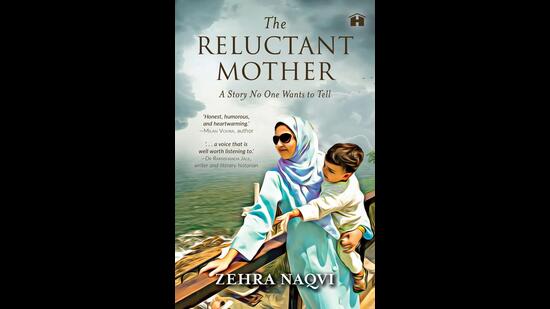Review: The Reluctant Mother by Zehra Naqvi
Feminist poet and author Adrienne Rich once wrote that, “We know more about the air we breathe, the seas we travel, than about the nature and meaning of motherhood”. Feminist movements and writers, throughout history, have taken issue with the patriarchal discourse surrounding motherhood and the reproductive rights of women. The conversation surrounding the possible upturning of Roe v Wade in the United States has brought this to centre stage. Zehra Naqvi’s The Reluctant Mother, a memoir which comes from a place of brutal honesty, sets out to renegotiate the often problematic popular cultural representations of mothers and motherhood. Laying out her own journey as a young mother, Naqvi’s book is a no holds barred exposition of the ways in which social pressures shape the experience of motherhood, particularly in a South Asian context.
Written and organised in the form of date-stamped journal entries, the book begins with Naqvi’s pre-pregnancy life. A life in a city that the journalist is shown to have carefully built around a profession she is passionate about, and with a partner she had married despite societal opposition. It is this carefully obtained and therefore cherished independence of a woman from a small town woman who struggled for it, that may have seemed threatened by an unplanned pregnancy. Simultaneously interrogating the expectations of society and the emotional consequences of falling short of them, Naqvi apprises her readers of the fraught battles with the self that often characterize motherhood. As the author states, “I’m not a mother above everything else. I am a mother along with everything else that I am”.
Full of pop culture references to motherhood from the 2000s including Twilight’s Bella, Morticia Adams and even a nod to Kyunki Saas Bhi Kabhi Bahu Thi, these diary entries become a way for the author to also highlight a tangible transformation in the very fabric of marriage as an institution in India. “It is a moment suspended in time”, the author writes of her memoir in the introduction. Rightfully so, the narrative describes a coming-of-age of marriages in modern India, a negotiation with the past and a leap of faith into the future. Naqvi’s book is as much an exposition of motherhood as it is of the need for an equal partnership in marriages. Through personal experiences, the author notes how strenuous the experience of raising a child might be for women in long distance marriages. The absent father figure opens up spaces for in-laws to comment on how to raise a “mard bachcha” and toxic masculinity unveils itself at every painful moment. “The effects of patriarchy are never as strongly manifested as when you become a mother,” writes Naqvi.

Although a bit repetitive in parts, there is an authenticity to the narrative that shines through. The actual birthing process is almost visceral in its description yet as the author says, “words can only reflect so much and no more”. From being terrified of her own post pregnancy body to her fear of being dangerous to her offspring, Naqvi goes through these cycles of blame with a view to validate these experiences for young mothers. She is articulate and forthcoming about feeling like “being reduced to a bonded labourer”. Naqvi’s memoir is a testament to mothers who are straddling two different Indias, two different thought processes, bringing them “the whole, unvarnished truth”. The author quotes Andrei Lankov while stating that “To not have your suffering recognised is an almost unbearable form of violence”. And so, Naqvi’s book becomes a much needed validation of the trials and tribulations faced by ‘reluctant mothers’ everywhere.
Simar Bhasin is an independent journalist. She lives in New Delhi
The views expressed are personal
Enjoy unlimited digital access with HT Premium
Subscribe Now to continue reading

Feminist poet and author Adrienne Rich once wrote that, “We know more about the air we breathe, the seas we travel, than about the nature and meaning of motherhood”. Feminist movements and writers, throughout history, have taken issue with the patriarchal discourse surrounding motherhood and the reproductive rights of women. The conversation surrounding the possible upturning of Roe v Wade in the United States has brought this to centre stage. Zehra Naqvi’s The Reluctant Mother, a memoir which comes from a place of brutal honesty, sets out to renegotiate the often problematic popular cultural representations of mothers and motherhood. Laying out her own journey as a young mother, Naqvi’s book is a no holds barred exposition of the ways in which social pressures shape the experience of motherhood, particularly in a South Asian context.

Written and organised in the form of date-stamped journal entries, the book begins with Naqvi’s pre-pregnancy life. A life in a city that the journalist is shown to have carefully built around a profession she is passionate about, and with a partner she had married despite societal opposition. It is this carefully obtained and therefore cherished independence of a woman from a small town woman who struggled for it, that may have seemed threatened by an unplanned pregnancy. Simultaneously interrogating the expectations of society and the emotional consequences of falling short of them, Naqvi apprises her readers of the fraught battles with the self that often characterize motherhood. As the author states, “I’m not a mother above everything else. I am a mother along with everything else that I am”.
Full of pop culture references to motherhood from the 2000s including Twilight’s Bella, Morticia Adams and even a nod to Kyunki Saas Bhi Kabhi Bahu Thi, these diary entries become a way for the author to also highlight a tangible transformation in the very fabric of marriage as an institution in India. “It is a moment suspended in time”, the author writes of her memoir in the introduction. Rightfully so, the narrative describes a coming-of-age of marriages in modern India, a negotiation with the past and a leap of faith into the future. Naqvi’s book is as much an exposition of motherhood as it is of the need for an equal partnership in marriages. Through personal experiences, the author notes how strenuous the experience of raising a child might be for women in long distance marriages. The absent father figure opens up spaces for in-laws to comment on how to raise a “mard bachcha” and toxic masculinity unveils itself at every painful moment. “The effects of patriarchy are never as strongly manifested as when you become a mother,” writes Naqvi.

Although a bit repetitive in parts, there is an authenticity to the narrative that shines through. The actual birthing process is almost visceral in its description yet as the author says, “words can only reflect so much and no more”. From being terrified of her own post pregnancy body to her fear of being dangerous to her offspring, Naqvi goes through these cycles of blame with a view to validate these experiences for young mothers. She is articulate and forthcoming about feeling like “being reduced to a bonded labourer”. Naqvi’s memoir is a testament to mothers who are straddling two different Indias, two different thought processes, bringing them “the whole, unvarnished truth”. The author quotes Andrei Lankov while stating that “To not have your suffering recognised is an almost unbearable form of violence”. And so, Naqvi’s book becomes a much needed validation of the trials and tribulations faced by ‘reluctant mothers’ everywhere.
Simar Bhasin is an independent journalist. She lives in New Delhi
The views expressed are personal
Enjoy unlimited digital access with HT Premium
Subscribe Now to continue reading

